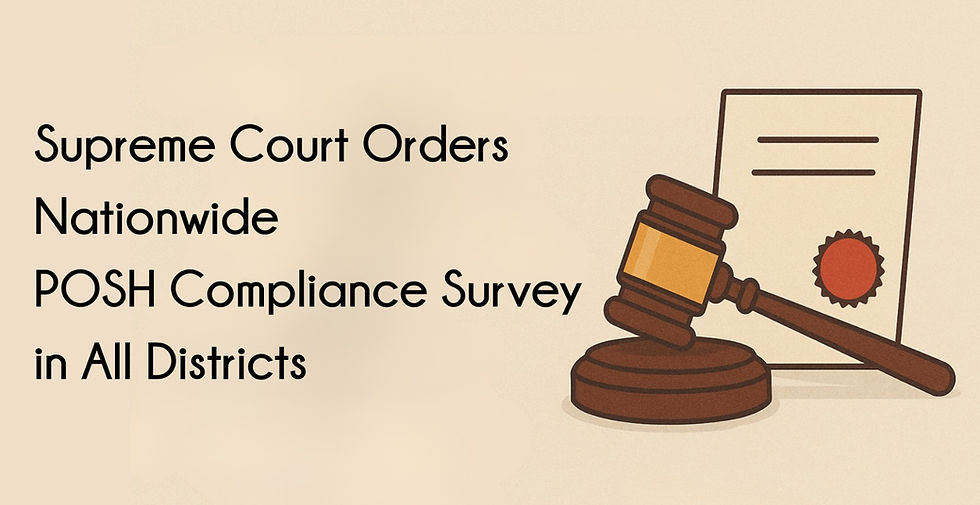Legal Spotlight: Chhattisgarh HC Upholds Disciplinary Action for Sexual Harassment – A Landmark Reminder for Employers and ICs
- LexPOSH

- Jun 14, 2025
- 2 min read
On May 2, 2025, the Division Bench of the Chhattisgarh High Court delivered a key judgment in Writ Appeal No. 292 of 2025, upholding the State Bank of India’s (SBI) disciplinary action against an employee for misbehaviour and sexual harassment of a female customer. The High Court affirmed that when Internal Committees (ICs) conduct inquiries in accordance with due process and principles of natural justice, courts will not interfere with their findings.
Background of the Case
The appellant, a Customer Assistant at SBI, was accused by a woman customer of misbehaviour during a bank visit. A detailed investigation followed, where multiple allegations were examined, including:
Misbehaviour with the customer
Misbehaviour with staff and colleagues
Sexual harassment of women employees and customers
Deliberate delays in customer service
Derogatory remarks against women
Habitual misconduct and indiscipline
The matter was referred to the Internal Complaints Committee (ICC) under the POSH Act, 2013, which recommended disciplinary action. After a full-fledged departmental inquiry — complying with the bipartite settlement and internal disciplinary processes — the Disciplinary Authority initially penalized the employee with reduction of two salary increments with cumulative effect and disqualification for future increments for two years. On appeal, the punishment was revised to a stoppage of two increments with cumulative effect.
The High Court’s Stand
The High Court dismissed the writ appeal, affirming that:
The inquiry was conducted by competent authorities.
Natural justice and procedural fairness were followed.
The allegations were substantiated through evidence.
No claims were made by the appellant about denial of cross-examination or access to documents.
The findings were not perverse or baseless, and hence, did not merit judicial interference.
The Court reiterated the principle set out by the Supreme Court in Ajai Kumar Srivastava v. DGM, stating that strict rules of evidence do not apply to departmental inquiries, and so long as there is some supporting evidence, courts will not substitute their judgment for that of the disciplinary authority.
Key Takeaways for Employers, HR Teams, and Internal Committees
Specialized Training for IC Members is Crucial: This case underlines the need for ICs to be equipped with legal knowledge, inquiry skills, and documentation practices to conduct fair and defensible inquiries.
Disciplinary Actions Will Withstand Judicial Scrutiny When Done Right: Courts will uphold actions that are fair, proportionate, and based on proper inquiry. This brings confidence to organizations taking action in POSH-related matters.
Workplace Safety Includes Customers and Visitors: This judgment expands the POSH lens — not just protecting employees but also customers, clients, and other women present in the workplace.
A Wake-Up Call for Organizations
This ruling is a strong reminder that:
Professional conduct is non-negotiable.
ICs must function independently, sensitively, and in strict compliance with the POSH Act.
A well-conducted inquiry has the legal strength to stand the test of judicial scrutiny.
Employers must recognize their obligation to provide a safe environment not only for employees but also for customers and visitors.
At LexPOSH, we believe in building workplaces anchored in dignity, respect, and safety. From IC training programs to mock inquiries and risk assessments, we equip organizations to be POSH-compliant and resilient.
If you’re looking to strengthen your IC or review your inquiry processes, we’re here to help.




